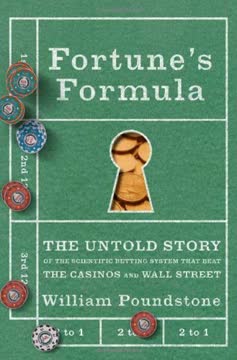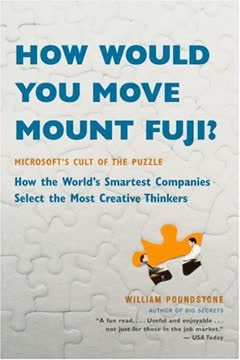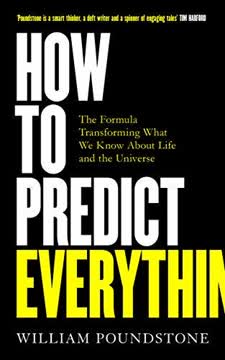Key Takeaways
1. Claude Shannon: The Architect of Information Theory
"It's said that it is one of the few times in history where somebody founded the field, asked all the right questions, and proved most of them and answered them all at once."
Information theory's birth. Claude Shannon, working at Bell Labs in the 1940s, single-handedly invented information theory. This groundbreaking work laid the foundation for modern digital communication, computing, and data compression. Shannon's theory quantified information, introducing concepts like bits, entropy, and channel capacity.
Beyond communication. Shannon's work extended beyond communication theory. He made significant contributions to cryptography during World War II, developed early chess-playing computers, and even dabbled in stock market analysis. His versatile genius and playful approach to problem-solving made him a legend in scientific circles.
2. The Kelly Criterion: Optimal Betting and Investing
"Gmax = R"
Maximizing growth. John Kelly, inspired by Shannon's work, developed the Kelly criterion in 1956. This formula determines the optimal fraction of capital to bet or invest to maximize long-term growth rate. The key insight: bet size should be proportional to the edge (advantage) and inversely proportional to the odds.
Applications in finance. The Kelly criterion found applications beyond gambling, particularly in financial markets. It provides a framework for risk management and portfolio optimization, balancing potential gains against the risk of ruin. Many successful investors and hedge funds have adopted variations of the Kelly strategy to guide their decisions.
3. Ed Thorp: From Blackjack to Wall Street
"To help persuade you that this may not be luck, I estimate that...I have made $80 billion worth of purchases and sales ('action,' in casino language) for my investors."
Beating the casino. Edward Thorp, a mathematics professor, applied probability theory to develop a winning strategy for blackjack. His book "Beat the Dealer" revolutionized casino gambling and card counting techniques.
Wall Street success. Thorp translated his gambling insights into financial markets, founding the highly successful hedge fund Princeton-Newport Partners. He pioneered statistical arbitrage and other quantitative trading strategies, consistently beating market returns over decades. Thorp's career exemplifies the power of applying mathematical models to both gambling and investing.
4. The Efficient Market Hypothesis vs. Market Beaters
"You'd have to be a fool not to know that he was talking about Michael Milken and Robert Freeman."
EMH challenges. The Efficient Market Hypothesis (EMH) asserts that market prices fully reflect all available information, making it impossible to consistently beat the market. However, the success of investors like Thorp, Warren Buffett, and James Simons challenges this theory.
Insider information. The 1980s Wall Street scandals, involving figures like Ivan Boesky and Michael Milken, highlighted how insider information could be exploited for massive profits. These events underscored the ongoing debate about market efficiency and the role of information in financial markets.
5. Long-Term Capital Management: When Genius Failed
"We spent time thinking about what happens if there's a magnitude ten earthquake in Tokyo, what happens if there's a 35 percent one-day crash in the U.S. stock market."
Nobel Prize-winning hubris. Long-Term Capital Management (LTCM), founded by John Meriwether and including Nobel laureates Myron Scholes and Robert Merton, epitomized the application of advanced financial theories to real-world investing. Their sophisticated models promised high returns with low risk.
Spectacular failure. LTCM's collapse in 1998 exposed the dangers of excessive leverage and overconfidence in mathematical models. The fund's failure to account for extreme market events and the limits of diversification led to a near-meltdown of the global financial system, requiring a Fed-orchestrated bailout.
6. Statistical Arbitrage: The New Frontier of Investing
"The advantage scientists bring into the game is less their mathematical or computational skills than their ability to think scientifically. They are less likely to accept an apparent winning strategy that might be a mere statistical fluke."
Quantitative revolution. Statistical arbitrage, pioneered by Thorp and others, uses advanced mathematical models and high-speed computing to identify and exploit small pricing inefficiencies across many securities. This approach has become a cornerstone of modern quantitative investing.
Evolving strategies. Successful statistical arbitrage requires constant innovation as markets adapt and inefficiencies disappear. Firms like Renaissance Technologies, D.E. Shaw, and Citadel have pushed the boundaries of quantitative investing, employing teams of mathematicians, physicists, and computer scientists to develop ever more sophisticated strategies.
7. The Power and Perils of Leverage in Finance
"When you're down by half, people figure you can go down all the way. They're going to push the market against you. They're not going to roll your trades. You're finished."
Amplifying returns. Leverage, the use of borrowed money to increase potential returns, is a double-edged sword in finance. It can magnify profits but also exacerbate losses. Many successful traders and funds use leverage to boost returns, but it requires careful risk management.
Systemic risk. The collapse of LTCM and later the 2008 financial crisis highlighted how excessive leverage in the financial system can lead to cascading failures and systemic risk. These events prompted renewed scrutiny of leverage practices and risk management in the financial industry.
8. Information Theory's Impact on Gambling and Investing
"A bit is worth 10,000 basis points."
Information as edge. Shannon's information theory provides a framework for understanding the value of information in both gambling and investing. The ability to extract signals from noise and accurately assess probabilities can provide a significant edge in both domains.
Quantifying uncertainty. Concepts from information theory, such as entropy and mutual information, have found applications in financial modeling, risk assessment, and portfolio optimization. These tools help investors and traders quantify uncertainty and make more informed decisions.
9. The Human Factor in Financial Markets
"Life, and everything in it, is based on arbitrage opportunities and their exploitation."
Behavioral biases. Despite the increasing use of quantitative models, human psychology continues to play a significant role in financial markets. Behavioral biases, such as overconfidence, herding, and loss aversion, create market inefficiencies that skilled investors can exploit.
Adapting to change. Successful investors and traders must constantly adapt to changing market conditions and new sources of information. The ability to recognize when strategies are no longer effective and to innovate new approaches is crucial for long-term success in financial markets.
Human nature in the markets:
- Overreaction to news
- Herding behavior
- Confirmation bias
- Recency bias
- Loss aversion
</instructions>
Last updated:
FAQ
What's Fortune's Formula about?
- Intersection of gambling and finance: The book explores how mathematical principles apply to both gambling strategies and financial theories.
- Key figures and stories: It highlights the contributions of influential individuals like Claude Shannon, Edward Thorp, and John Kelly, Jr., in understanding probability and risk.
- Scientific betting systems: Focuses on the development of systems that have successfully beaten casinos and Wall Street, emphasizing information theory and the Kelly Criterion.
Why should I read Fortune's Formula?
- Unique perspective on risk: Offers insights into applying mathematical concepts to real-world scenarios in gambling and investing.
- Historical context: Provides a historical overview of gambling and finance, illustrating the evolution of these fields.
- Practical applications: Readers can learn strategies like the Kelly Criterion to make informed betting or investment decisions.
What are the key takeaways of Fortune's Formula?
- Importance of information: Accurate information is crucial for successful bets or investments, as shown through the stories of Shannon and Thorp.
- Kelly Criterion explained: A formula that helps determine the optimal size of bets to maximize growth while minimizing risk.
- Randomness and unpredictability: Highlights the inherent randomness in gambling and stock markets, suggesting patterns are difficult to predict.
What is the Kelly Criterion as described in Fortune's Formula?
- Definition of the Kelly Criterion: A formula used to determine the optimal size of a series of bets, maximizing the expected logarithm of wealth.
- Formula application: Calculated as edge/odds, where edge is the expected advantage and odds are the public odds.
- Risk management: Helps avoid ruin by ensuring only a proportion of the bankroll is bet, allowing for sustainable growth.
How did Claude Shannon contribute to gambling strategies in Fortune's Formula?
- Pioneer of information theory: Shannon's work laid the foundation for quantifying information to make better decisions in uncertain environments.
- Roulette prediction machine: Collaborated with Edward Thorp to develop a device predicting roulette outcomes, applying his theories practically.
- Impact on gambling: His insights into randomness and information shaped modern gambling strategies.
What role did Edward Thorp play in Fortune's Formula?
- Innovative blackjack player: Applied the Kelly Criterion to blackjack, using card counting to gain an edge over casinos.
- Author of Beat the Dealer: Popularized card counting and mathematical strategies in gambling.
- Transition to investing: Applied similar strategies in the stock market, achieving remarkable returns.
How does Fortune's Formula address the concept of arbitrage?
- Definition of arbitrage: Explains arbitrage as exploiting price differences in different markets to secure a profit without risk.
- Historical examples: Provides context with examples of early financiers like Jay Gould exploiting arbitrage opportunities.
- Modern implications: Connects historical practices to contemporary trading strategies, showing the relevance of arbitrage today.
How does Fortune's Formula illustrate the relationship between gambling and investing?
- Shared principles: Draws parallels between gambling strategies and investment techniques, relying on probability and risk assessment.
- Mathematical foundations: Emphasizes using mathematical rigor, like the Kelly Criterion, to guide decision-making.
- Behavioral insights: Explores psychological factors influencing both gamblers and investors, highlighting the importance of understanding human behavior.
What is the significance of the St. Petersburg wager in Fortune's Formula?
- Concept of expected value: Illustrates the paradox of expected value in gambling, where theoretical payout can be infinite.
- Daniel Bernoulli's contribution: Discusses Bernoulli's insights into risk and utility, emphasizing irrational behavior in uncertain outcomes.
- Application to modern finance: Principles from the wager are relevant to understanding risk and decision-making in gambling and investing.
How does Fortune's Formula explain the concept of utility?
- Subjective value of money: Utility refers to the subjective value individuals place on money, varying based on wealth and circumstances.
- Diminishing returns: Discusses how utility from additional wealth decreases as one becomes richer, leading to Bernoulli's logarithmic utility function.
- Practical implications: Helps investors and gamblers make better decisions by recognizing not all monetary gains are equally valuable.
What role does risk play in Fortune's Formula?
- Central theme: Explores how to manage and quantify risk in gambling and investing.
- Risk of ruin: Emphasizes avoiding ruin through strategies like the Kelly Criterion, balancing potential gains against catastrophic losses.
- Psychological factors: Illustrates how human behavior influences decision-making in uncertain environments.
How does Fortune's Formula address the concept of overbetting?
- Definition of overbetting: Occurs when risking more than prudent, often leading to significant losses and potential ruin.
- Consequences of overbetting: Illustrates catastrophic outcomes, such as LTCM's collapse due to excessive leverage.
- Kelly Criterion as a safeguard: Adhering to the Kelly Criterion helps avoid overbetting, aligning risk-taking with long-term financial goals.
Review Summary
Fortune's Formula receives mostly positive reviews for its engaging narrative blending mathematics, gambling, and finance. Readers praise Poundstone's ability to explain complex concepts in an accessible way, weaving together stories of scientists, mobsters, and Wall Street. Many find the book fascinating and enlightening, particularly regarding the Kelly criterion and its applications. Some criticize the book for being too formulaic or lacking depth in certain areas. Overall, reviewers appreciate the book's unique perspective on risk and investing.
Similar Books










Download PDF
Download EPUB
.epub digital book format is ideal for reading ebooks on phones, tablets, and e-readers.










